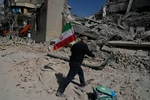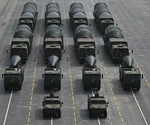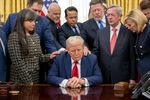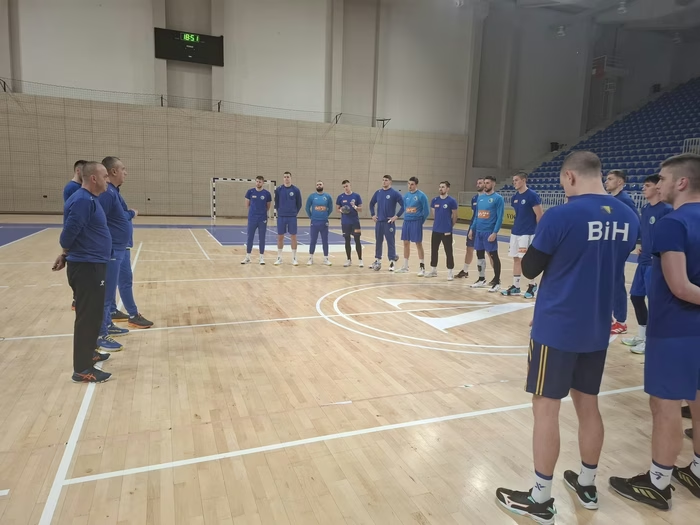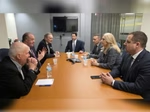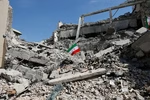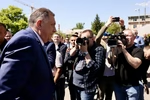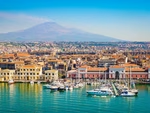
Bosnian Serb leader Milorad Dodik said on Saturday that he will speak in Belgrade with Russia’s PM Dmitry Medvedev about the political situation in Bosnia and that Bosnia’s international administrator plans at a UN Security Council session by the end of the year to blame the Bosnian Serbs “for everything” that is wrong in the country.
Dodik, the Bosnian Serb member of the country’s tripartite presidency, attended together with Medvedev and Serbian President Aleksandar Vucic a Serbian military exercise near Belgrade and said he was impressed with what he saw.
Having in mind the times ahead of us, “Serbia is becoming a guarantee for the security of all Serbs, no matter where they live,” Dodik told ATV.
He repeated statements by Serbian President Aleksandar Vucic, who said that nothing similar to the 1995 Operation ‘Storm’ will ever take place again.
‘Storm’ was a 1995 Croatian Army military operation that resulted in Zagreb taking back control over parts of Croatia the Serbs inhabited and controlled. As the Croatian Army was advancing, Serbs were fleeing the area en masse.
Dodik said that the Bosnian Serbs got the message Vucic had sent with his statement. Serbia’s police and military are the best in the region and are steered toward maintaining peace, he said.
Republika Srpska (RS), the Serb-dominated semi-autonomous entity within Bosnia, does not want to jeopardize the peace but it also intends to fight for its political status and the right to determine which way it wants to go, he stressed.
For years Dodik has been advocating the secession of the Bosnian Serb half of the country from Bosnia and its annexation to Serbia.
“Those who don’t want to let us have that freedom are prepared to use force. And this is why we need to think about making our police capable and develop various forms of cooperation with our friends,” he said.
Dodik said he will tell Medvedev that pressure from NATO for Bosnia to join the alliance.
Bosnian Serb resistance to this idea is part of the reason for why the country’s has still not formed its new government for almost a year after the October 2018 election.
But if Bosnia would make one more step toward NATO membership by sending to the alliance it's Annual National Program, “we know that we could not count on any support” from Serbia or Russia, Dodik said. “We would only be able to watch what we have seen today on postcards,” he added, referring to the demonstration of Serbia’s military.
He stressed that the Drina river, which is the natural border between Bosnia and Serbia, can not be the outer border of NATO.
The Bosnian Serb leader also said he will discuss other issues with Medvedev, including economic cooperation. Republika Srpska plans to join the TurkStream - a natural gas pipeline running from the Russian Federation to Europe over Turkey - but “this, of course, depends on when the pipeline will arrive in Serbia, then, of course, the RS will join,” he said.
He added that RS representatives have agreed on certain arrangements with the management of Russia's Gazprom, which he will discuss with Medvedev.
Serbia and Russia have great cooperation and that is also important for the population of Kosovo, he argued.
"The position of Russia has proven to be neutral,” Dodik said. “They support the local governments and do not interfere with internal issues, they have their own military-political priorities and Russia has not granted recognition to Kosovo."
Dodik emphasised that Russia supports the 1995 Dayton Peace Agreement which ended the war in Bosnia.
“Thanks to Russia we have an opportunity for our voice to be heard in the UN Security Council,” he said.
He accused the international official named to oversee the civilian implementation of the Dayton Agreement, Austrian diplomat Valentin Inzko, of “manipulating when presenting the situation in Bosnia for years.”
“Most often, he ignores the situation and tries to blame Republika Srpska for everything. That will also happen at the end of this month and the beginning of the next when the Security Council discusses the situation in Bosnia,” he said.
“We are preparing our own report, as was the case until not, and we will submit it, above all to our friends, the ambassador of the Russian Federation,” he added.
Kakvo je tvoje mišljenje o ovome?
Učestvuj u diskusiji ili pročitaj komentare





 Srbija
Srbija
 Hrvatska
Hrvatska
 Slovenija
Slovenija








